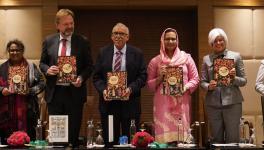5 Years of #MeToo: How a Hashtag Shook Up The World
For many women, the most important hashtag on Twitter: #MeToo
When The New York Times published an article headlined "Harvey Weinstein Paid Off Sexual Harassment Accusers for Decades" on October 5, 2017, it could not have imagined that it would trigger a global media phenomenon.
In the article, journalists Jodi Kantor and Megan Twohey laid out how studio mogul Harvey Weinstein, producer of numerous Oscar and Hollywood hits, had sexually abused and harassed women for decades.
This directly resulted in the #MeToo movement: Following a call by US actor Alyssa Milano, women shared their experiences of sexualized violence on social networks under the hashtag "me too." On the very first day, the hashtag was used 200,000 times on Twitter. By the next day, it had been used more than half a million times. #MeToo trended in more than 85 countries with offshoots in diverse languages.
It was originally coined by human rights activist Tarana Burke in 2006 on the social network "Myspace" in her dealings with young victims of sexualized violence.
Since then, women around the world have been demonstrating against sexualized violence, with feminists in the West calling for the system to be overhauled.
Facing new accusations: Harvey Weinstein 2021 at a hearing in court
What happened next?
Five years have passed, and Harvey Weinstein is serving his sentence of 23 years in prison.
Other celebrities have also been sentenced to prison; for example, the US actor Bill Cosby.
French photographer Jean-Claude Arnault also received a prison sentence for raping a woman. Arnault, who is well-known in Sweden's cultural scene, was married to a former member of the centuries-old Swedish Academy, which awards the annual Nobel Prize for Literature. Following the scandal, the academy suspended the prize-giving in 2018.
Along with journalist Ronan Farrow, Jodi Kantor and MeganTwohey won the important US Pulitzer Prize for public service for their reporting on Harvey Weinstein's crimes. Their research has even been made into a film by a Hollywood studio under the title "She Said," directed by German director Maria Schrader.
Megan Twohey, Jodi Kantor and Ronan Farrow at the 2018 Pulitzer Prize Awards
Abortion rights have also become a concern in the debate sparked by #MeToo.
In 2022, Germany relaxed Paragraph 219a, the so-called ban on advertising abortions that made it impossible for doctors to even provide information about the procedure on their websites.
This year, demonstrations for women's rights under the slogan #MeToo took place in different cities, from Paris and Amsterdam to Kathmandu.
Alyssa Milano (center) also protested Brett Kavanaugh's appointment to the Supreme Court
Success followed by backlash
Parallel to the movement's success, backlash against women's rights can also be observed.
In the US in 2018, lawyer Brett Kavanaugh was appointed by former President Donald Trump as a justice on the Supreme Court, the country's highest court — even though he faced serious sexual assault allegations.
In 2022, the US Supreme Court reversed a 1973 court ruling (known as "Roe vs Wade" after the names of the plaintiff woman and the prosecutor) that had for decades established federal abortion rights in the United States.
Hungary also tightened abortion laws.
And in the same year, the court case involving Amber Heard and her ex-husband Johnny Depp brought home to a world audience that women who dare to go public with experiences of violence are still met with scorn and contempt.
Amber Heard (center) was ordered to pay $15 million in damages to her ex-husband Johnny Depp
Action instead of words
While women in Afghanistan and Iran are risking their lives to stand up for their human rights five years after #MeToo, British feminist Laura Bates is calling on the West to walk the talk: In her book "Fix the Women, Not the System," she calls for urgent reform in the judiciary, police, politics, education and the media.
The realization that sexualized violence against women is a global systemic problem has been exposed by the #MeToo movement. Laura Bates, who founded the Everyday Sexism Project, calls for drawing the consequences: "Nothing will change," she writes in the fifth year since the #MeToo movement began, "until we acknowledge that the problem is in the system, not with women."
This article was originally written in German.
Get the latest reports & analysis with people's perspective on Protests, movements & deep analytical videos, discussions of the current affairs in your Telegram app. Subscribe to NewsClick's Telegram channel & get Real-Time updates on stories, as they get published on our website.




























